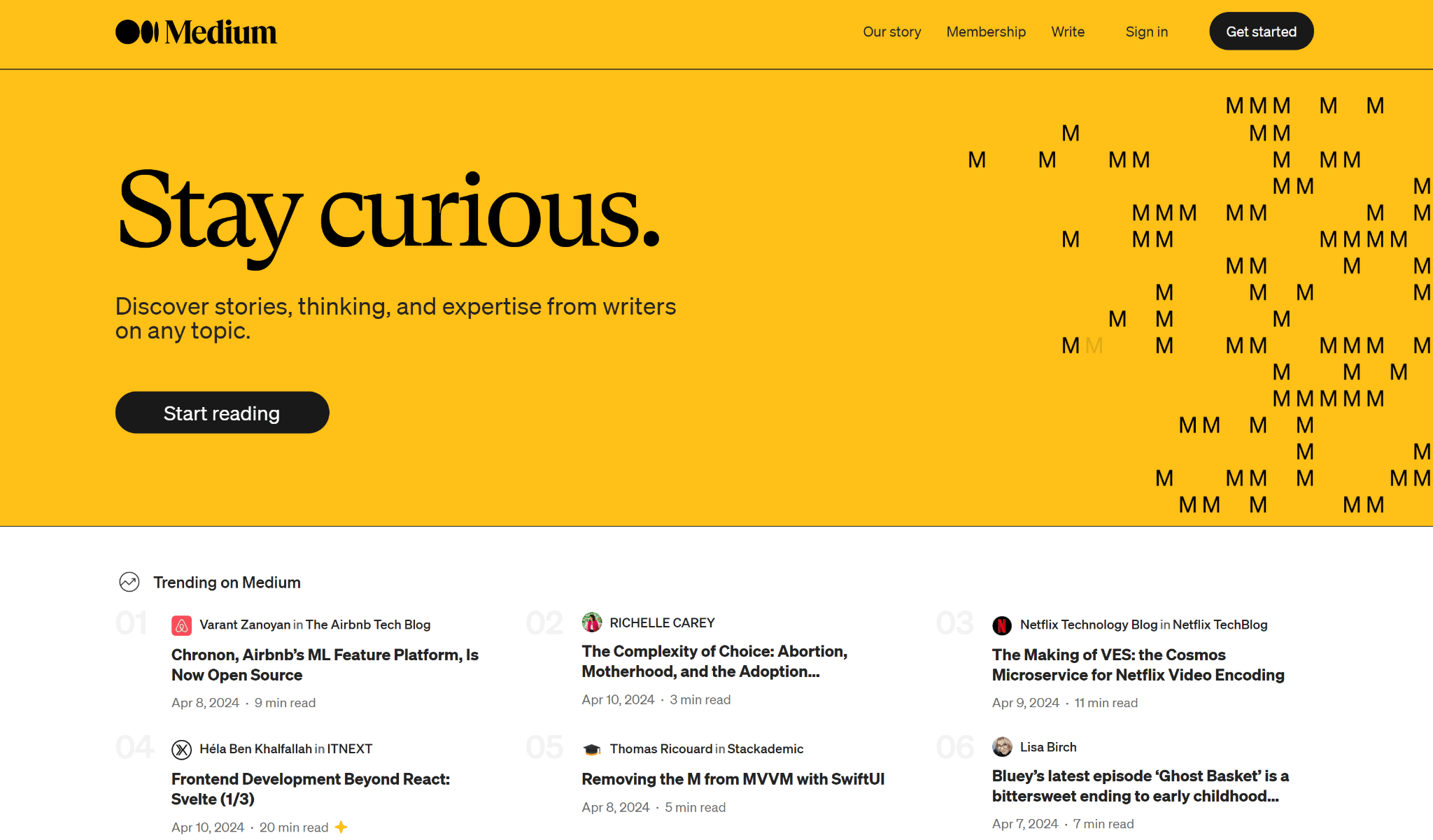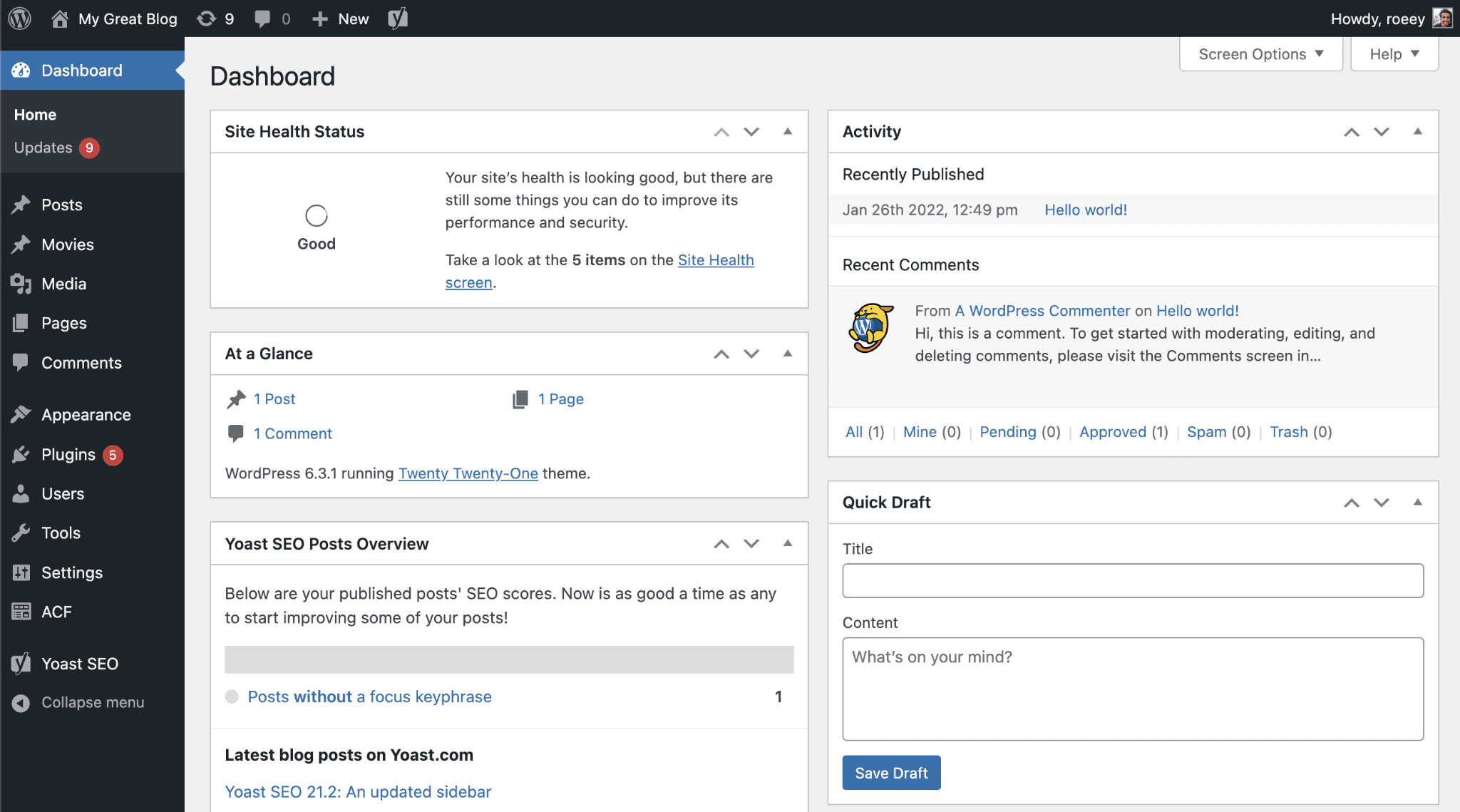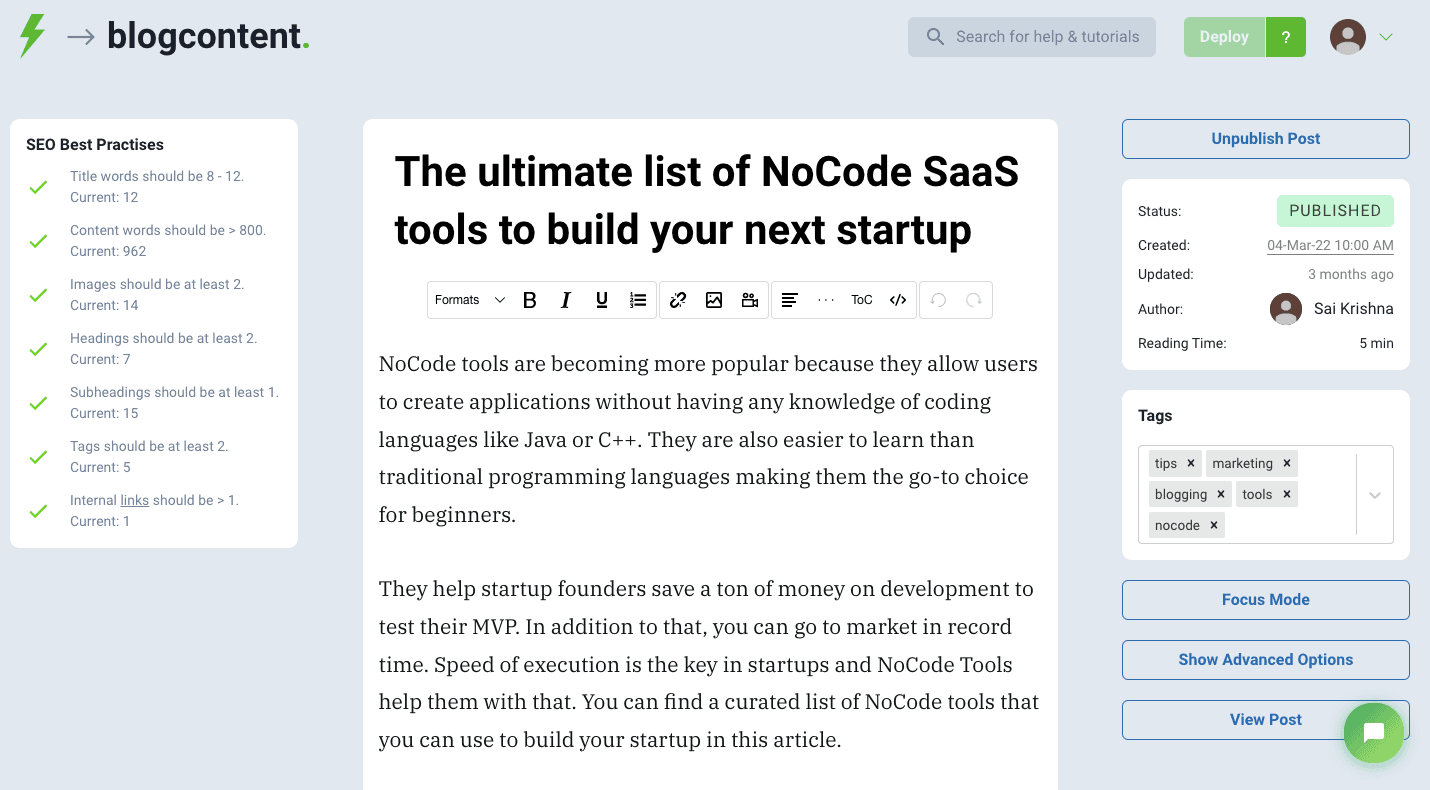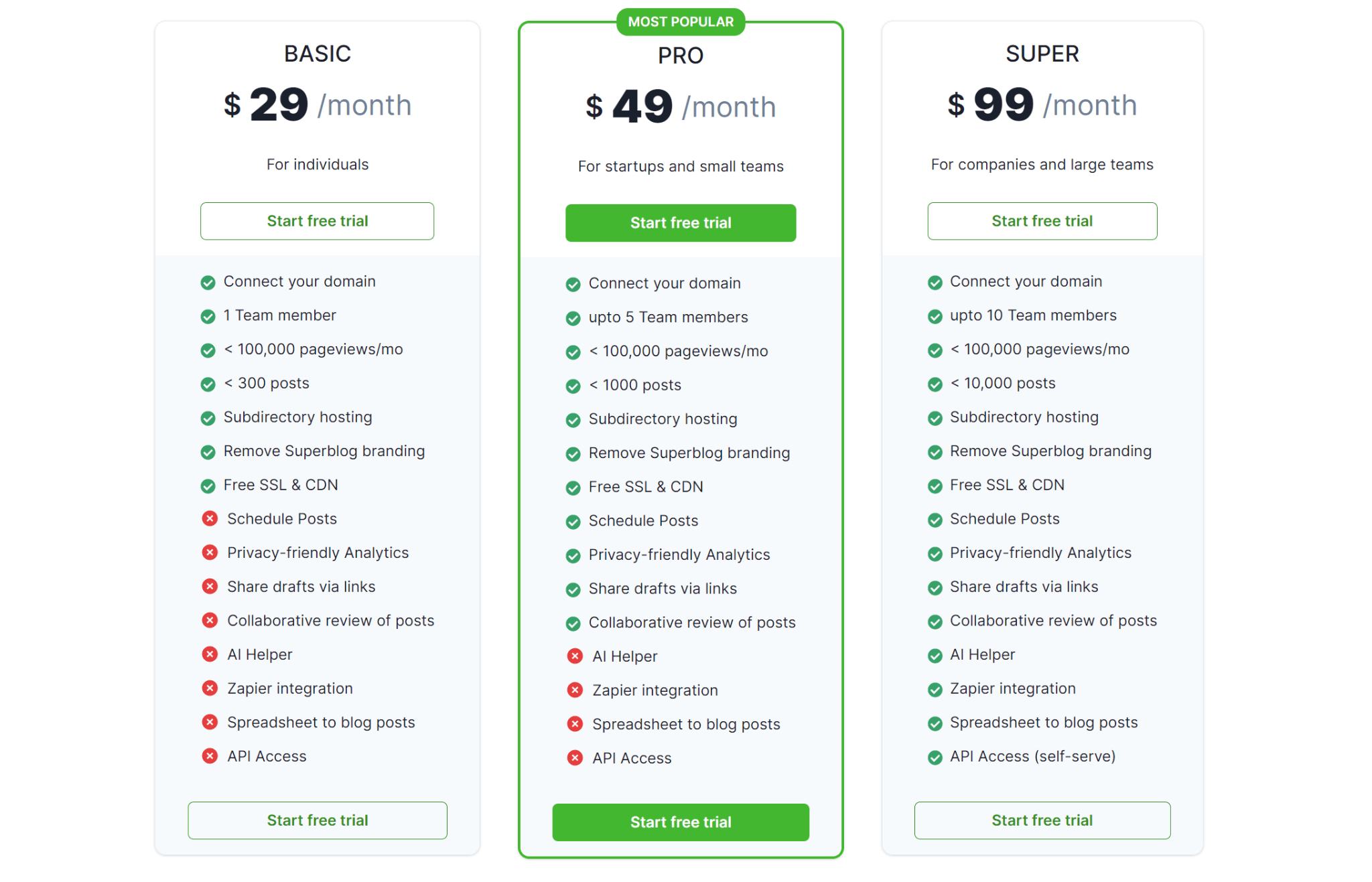Medium vs. WordPress vs. Superblog: We Compare the Top Blogging Platforms
Helpful summary
- Overview: This article presents a comprehensive comparison of three popular blogging platforms—Medium, WordPress, and Superblog. It evaluates them based on several criteria including SEO optimization, speed and performance, maintenance and setup, features, price plans, and more.
- Why you can trust us: We may not have the same name recognition as platforms like Medium and WordPress, but we’re confident Superblog is a strong contender in the blogging world. Our team has spent countless hours researching and comparing our platform with others to ensure that our users have access to the best tools and features.
- Why this is important: Choosing the right blogging platform is crucial for startups as it affects their online presence, audience engagement, and marketing effectiveness. Our comparison has valuable information that can help startups make an informed decision based on specific needs.
- Action points: Evaluate the SEO needs and technical capabilities of your startup to decide based on key differentiators like the automatic optimization of Superblog, the manual (but comprehensive) customization of WordPress, or the internal discovery system of Medium.
- Further research: Check out the Superblog blog for more SEO, writing, and blogging tips.
Medium, WordPress, or Superblog?
For SaaS and tech startups, blogging isn’t just a marketing tool—it’s a platform for thought leadership, community-building, and brand establishment. Selecting the right blogging platform can be crucial to your startup’s online presence, outreach, and ultimately, its success.
But with a myriad of options available, how do you pick the best one for your specific needs?
Today, we’ll analyze three popular blogging platforms—Medium, WordPress, and the up-and-coming Superblog. Each offers unique strengths and caters to different types of businesses. We’ll break down each platform's key features, benefits, and drawbacks to help you find the right fit.
Why Listen to Us?
At Superblog, we’re on a mission to build the perfect blogging platform for writers, founders, and startups looking to establish a strong online presence. Our team has personally tested and used all three platforms, giving us the unique perspective to compare and contrast them objectively.

Now, let’s examine the details of each platform to determine which one is best for you.
Medium vs. WordPress vs. Superblog: An Overview
Before we dive in, here’s a quick overview of some of the key differences between these three platforms:
SEO
- Superblog: Superblog offers automatic SEO, including auto-generation sitemaps and image optimization, which helps startups improve their search engine rankings with minimal effort.
- Medium: Medium does not provide the same SEO customization or tools. Instead, it focuses on its internal discovery system.
- WordPress: While WordPress offers plugins to simplify and enhance SEO, these can be time-consuming to set up and may require some technical know-how.
Speed and Performance
- Superblog: Superblog automatically optimizes your blog for speed, design, and readability, ensuring that blogs load quickly and perform well (crucial for UX and SEO).
- Medium: Medium offers consistent performance but lacks customization options that could further optimize speed for specific needs.
- WordPress: WordPress’ speed varies significantly based on the theme, plugins, and hosting service used. Achieving optimal performance often requires technical optimization work.
Maintenance and Setup
- Superblog: Superblog offers an easy setup process with no server maintenance required, allowing startups to go live in less than two minutes.
- Medium: Medium also offers an easy setup and eliminates maintenance, but this comes at the cost of losing control over the blog’s appearance and functionality.
- WordPress: WordPress requires ongoing maintenance for security, updates, and backups. The setup can be complex, involving themes and plugin configurations.
Customization and Control
- Superblog: Superblog’s customization options include branding, custom CSS, CTA buttons, lead generation forms, and custom code insertion.
- Medium: Medium offers minimal customization options, focusing on content creation within a standardized format. It lacks the ability to add custom CTA elements or lead generation forms directly.
- WordPress: WordPress offers extensive customization through themes and plugins but requires more effort and technical knowledge to configure and maintain these customizations.
What Is Medium?
Medium is an incredibly popular publishing platform with a focus on content creation.

It’s sometimes described as a hybrid between a blogging platform and a social network—users can create and publish their own content, as well as engage with other users by liking, commenting, and sharing their posts.
Medium is known for its user-friendly interface, clean design, and focus on quality written content. It offers a basic text editor (similar to Google Docs) and support for rich media like images, videos, and embeds.
While businesses sometimes use it as a content marketing tool, Medium is primarily used by individual writers and bloggers to share their thoughts, ideas, and expertise with a wider audience. It’s also become a popular platform for thought leaders, journalists, and creatives to publish long-form articles or essays.
Key features
- Built-in audience and domain authority: Medium has a massive built-in audience and high domain authority, which can help writers reach a wider audience than they might on their platforms.
- Monetization through the partner program: Medium offers a Partner Program that allows writers to earn money based on the engagement of their articles. This program is designed to monetize content and provide a passive income stream for writers.
- Content discovery based on readability: Medium focuses on the readability of posts rather than just hits or views. The platform uses an algorithm that bases content discovery on whether people have actually read the articles, emphasizing quality and engagement over mere traffic.
Pricing
It’s free to write and publish on Medium. Joining the Partner Program to earn money from your content is also free. However, there is a paywall for readers who want to access exclusive content or go past the monthly limit of free articles.
Pros
- Streamlined publishing process
- No setup required
- Built-in community
Cons
- Medium retains control over your content
- Limited SEO
- Restrictions on monetization strategies
What is WordPress?
Unlike Medium, WordPress is all about publishing. It’s the world’s most popular content management system (CMS), currently powering over 43% of all websites on the internet. WordPress is a free, open-source platform that offers a ton of useful features for bloggers.

Under the hood, you’ll find a powerful publishing engine that allows you to create and manage your content easily. You can also customize your site with themes and plugins, making it fully customizable for any blog or website.
The downside? WordPress is complicated to learn due to its vast array of features and customization options. Plus, you also need to learn to use plugins if you want to fill key gaps. This leads to knock-on issues with speed, maintenance, and security.
Key features
- Flexibility: WordPress allows users to create various websites, from personal blogs to complex business sites, online stores, and more. It supports extensive customization through themes and plugins.
- User management: WordPress offers a comprehensive system for managing users with different roles and permissions, enabling a collaborative content creation and site management environment.
- Media management: The platform provides a fairly intuitive system for uploading, organizing, and embedding media content, making it easy to manage images, videos, and other media files within a website.
Pricing
WordPress has a selection of six plans:

- Starter ($4/mo): Free domain for one year
- Explorer ($8/mo): Customize fonts and colors
- Creator ($25/mo): 24/7 expert support
- Entrepreneur ($45/mo): Custom marketing automation
- Cloud ($65/mo): One-click restores
- Enterprise (custom plan starting at $25,000/year)
Pros
- Vast library of themes and plugins
- Full control over content and SEO
- Large community and extensive support documentation
Cons
- Requires technical knowledge for setup
- Relies on plugins for key blogging features
- Often slow, bloated, and prone to performance issues
Best Medium & WordPress Alternative: Superblog
Superblog is a fast, lightweight, and fully featured alternative to Medium and WordPress.

Our focus is on giving bloggers, SaaS businesses, and startups all the tools they need to drive traffic (and revenue) through content marketing— not weighing them down with unnecessary features and technical hurdles.
Setting up a blog with Superblog is as simple as signing up for an account, setting up the custom domain (blog.example.com or example.com/blog), and creating your first posts. Our editor offers useful features like AI assistance, automatic SEO suggestions, and more to help speed this process up.
Key Features
- SEO optimization: Superblog automatically handles SEO audits, page speed, and optimization and ensures the blog is optimized for search engines without manual effort from on your part.
- Customization options: You can easily customize the look and feel of your blog to match your company branding, with options for fonts, colors, and layouts.
- AI helper: We also offer an AI helper feature that can speed up content creation with content outlines, title suggestions, and more.
- Auto-import: Don’t want to import each post individually? Use our auto-import feature to import posts from Medium, WordPress, Ghost, Webflow, and more automatically.
- Content management: Organize your content with custom tags and categories, as well as author profiles and credits.
- Easy setup and maintenance-free: Superblog offers an auto-optimized platform for speed and SEO, requiring zero setup or ongoing maintenance from the user.
Pricing
Here at Superblog we keep our pricing simple and transparent with three plans.

- Basic ($29/mo): <300 posts
- Pro ($49/mo): <1,000 posts
- Super ($99/mo): <10,000 posts
Higher-tier plans unlock advanced features like post-scheduling, draft sharing, and API access.
Pros
- Always fast
- AI helper
- Connect to your own domain
- Automatic high-score in SEO, Google Lighthouse, and Core Web Vitals
- Zero maintenance
- Built-in optimizations for SEO
- 99.99% uptime
- Speed, secure against malware
- Easy migration from other platforms
Cons
- A newer platform with a smaller user base
Medium vs. WordPress vs. Superblog: Feature Comparision
Aspect | Superblog | Medium | WordPress |
|---|---|---|---|
Ease of Use | High, simple setup, no maintenance | High, intuitive interface | Moderate, steep learning curve for beginners |
Customization | Moderate: layout choices, custom JS/CSS | Low: limited design options | High: extensive themes and plugins |
SEO optimization | High: automatic SEO audits and optimization | Moderate: built-in audience, limited SEO tools | High: requires plugins and manual effort |
Performance | High: pre-built pages, global CDN | High: consistent user experience | Variable: depends on hosting and plugins |
Monetization | Moderate: Google AdSense support, lead generation features | Medium: Partner Program, limited options | High: full control over monetization strategies |
Integration capabilities | Moderate: Zapier integration, Google Analytics | Low: limited third-party integrations | High: extensive plugin ecosystem |
Mobile responsiveness | High: automatically optimized | High: optimized for mobile | High: theme dependent |
Security | High: managed by Superblog | High: managed by Medium | Variable: user-managed, plugin dependent |
Support and community | Moderate: customer support available | Moderate: Medium help center | High: large community, extensive documentation |
Pricing | Subscription-based with free trial | Free for publishing, paid membership for readers | Free software, costs for hosting, themes, plugins |
Custom domain | Available | Available | Available |
Data portability | Easy content download | Can export content | Full export capabilities |
Reading experience | Beautiful reading experience | Good | Customizable |
Use case | Startups, SEO bloggers | Individual writers | Versatile |
Conclusion
Choosing the right platform boils down to the balance between ease of use, customization, content ownership, and audience reach.
If you’re ready to take your blogging to the next level with a platform that combines efficiency and effectiveness, consider trying Superblog. With its automatic SEO, fast loading times, and user-friendly interface, Superblog is designed for startups who want to maximize their online presence efficiently.
Get started with a free trial and see what Superblog can do!
